Our editors independently select these products. Making a purchase through our links may earn Well+Good a commission
6 Apps That Identify Your Plants and Help You Save Them From the Brink of Death
We tried and tested the best plant identification apps available to see which ones were the most accurate. Learn about each app here.

It doesn’t matter how seasoned you are as a gardener–sometimes you have a dying plant and truly don’t know how to save it. Maybe your plant’s leaves are turning yellow, or its stems are beginning to droop. You stare at it hopelessly, wracking your brain for answers: Is it time for a pruning? Am I drowning you in water? Are you getting completely dehydrated from too much sun?
Experts in This Article
professional gardener and founder of The Brown Thumb
If you can’t immediately spot the issue, don’t worry: Help is on the way! All you need is to find an app that identifies plants and what they need to truly survive.
Why use plant identification apps?
According to professional gardener and The Brown Thumb plant shop owner Monique Leonard-Segovia, identifying your plant’s species is the first step in understanding how to care for them best. Once you know your plant’s species, you can make informed decisions in regard to how much water you give them, how much sunlight you expose them to, and what type of soil is best to promote growth.
“Every plant is different,” adds Leonard-Segovia. “For example, an allocasia is going to need more frequent waterings versus a snake plant, which you’re gonna water every three weeks. Every plant needs something different unless it’s, say, in the same family.”
Plant identification apps can also shed light on the unique quirks of your plant, such as toxicity for pets or distinct nutrient preferences. While some fruit plants thrive with a healthy dose of coffee grounds in their soil, other plants fare better with less acidic soil add-ins like milk. Some flowers hold symbolic meanings of love and peace, while others are known to bring good luck.
6 Best plant identification apps
While gardening can be a mentally grounding practice that helps us get in touch with the natural world, modern technology can help smooth over the rough patches. Think of these apps as TeleHealth, but for your flora fam. With just a photo, you can uncover a wealth of information about your struggling buds.
Whether you’re curious about the general needs of a plant or you need a diagnosis, stat, we have you covered. In order to test each plant app’s accuracy, we used a golden pothos as our test subject. Read ahead to see how each performed, plus the special features and tools that make them some of the best plant identification apps on the market.
1. Blossom

Price: $30/year, with a 3-day free trial
The Blossom app does a little bit of everything. Once you take a snapshot of your plant, the app lays out its care level, water requirements, and light requirements. When you do a little digging, you get more details on everything from best fertilizing practices to humidity preferences. The app features a wide array of informative articles and videos to help you become a better plant parent, and can diagnose your plant’s health, too.
Some may love the super simple app design, but in our opinion, it could use a bit more detail, especially for the $30-per-year price tag. The app also lacks a social media component for those looking to share their plant finds with other enthusiasts.
This app proved to be very accurate in identifying our golden pothos. The other apps on this list attempt to identify plants with one photo, but Blossom asked me for three in order to provide the best result possible.
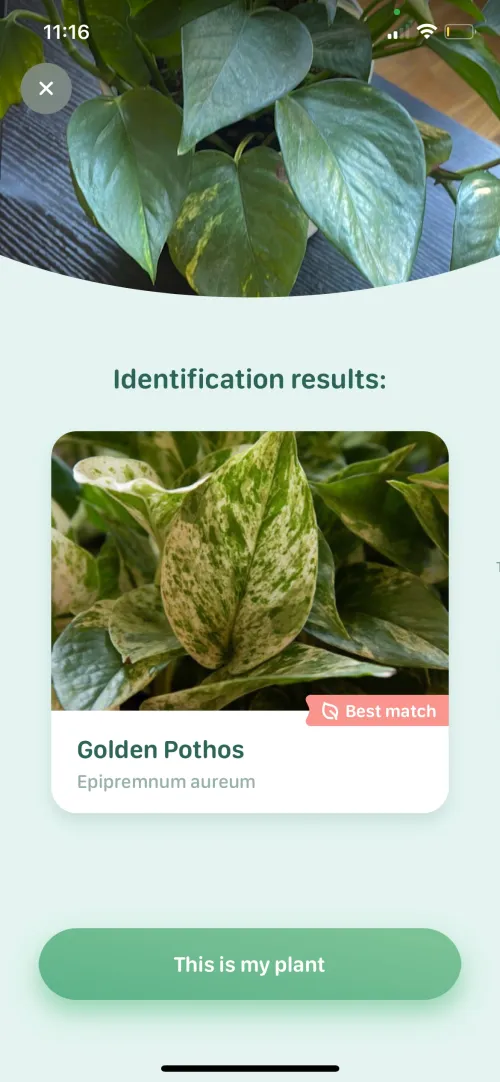
Pros:
- Accurate identification (asks for three photos rather than one)
- Can diagnose your plant’s health
- Can create a plant care schedule for you
- Can ask a botanist or ChatBot for advice
- Helpful videos and articles in-app
Cons:
- While pretty, the app design is a little too simple
- No social media component
- A bit pricey at $30 per year
2. PictureThis
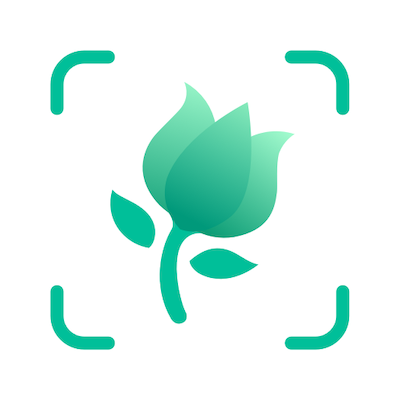
Price: $30/year, with a 7-day free trial
PictureThis doesn’t *just* identify plants. It also analyzes their health, delivering you a full diagnosis of their potential ailments.
Its best feature, beyond a shadow of doubt, is the “diagnose” section. You upload up to three shots of your plants biggest woes, and it’ll tell you straight-up what might be the problem. Still not sure what’s wrong? Don’t worry, there’s an Ask an Expert section to get you a little professional first aid. The only caveat, that we can tell, is that PictureThis will cost you some dough.
When we put PictureThis to the test, it was able to quickly identify our golden pothos and diagnose the cause of its yellowing leaves, too. That’s a plant care win-win.
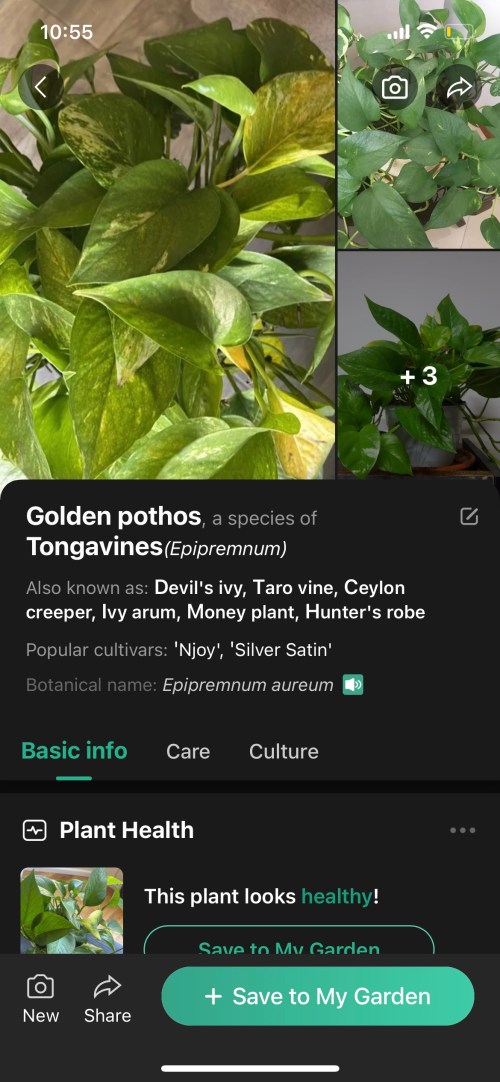
Pros:
- Accurate identification
- Can diagnose your plant’s health
- Can send watering reminders
- Ask an Expert option
- Has useful articles and books in-app
- Can also identify birds and insects
Cons:
- A bit pricey at $30 per year
- Users report app bugs especially regarding health diagnoses
3. Plantum
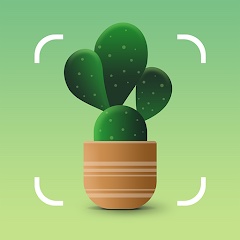
Price: $40/year or $7/week, with a 3-day free trial
Thanks to its strong plant diagnoses capability and plant care features, Plantum can turn a habitual plant killer into a self-taught plant doctor. Plantum has several unique plant health components that other apps on this list lack, including a pot measuring tool and a sunlight meter.
When it comes to accuracy, however, Plantum really struggled to identify our pothos. We adjusted our camera distance, the room’s lighting, and got rid of all background items, and yet, the app *still* misidentified the plant, first as a heart leaf philodendron and then again as a rhaphidophora.
While it couldn’t seem to get the species right, it was able to recognize its browning leaves as a potential health concern. This ability, coupled with the scheduling options and plant care reminders make this a stronger plant diagnosis app rather than a plant identification app.
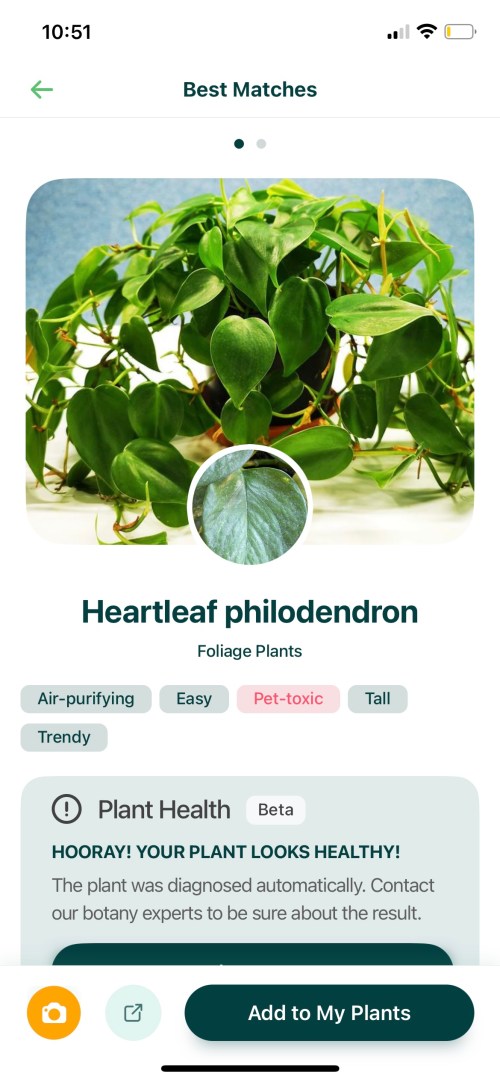
Pros:
- Accurate health diagnoses
- Can send watering reminders
- Tons of helpful tips and tricks
- Can measure light intensity and calculate the size of your pot
Cons:
- Not very accurate
- A bit pricey at $40 per year
4. Google

Price: Free
Surprise, surprise! One of the best free plant identification apps available on the market isn’t even advertised as one.
The Google app (not to be confused with the Google Chrome browser app) can identify plants with the help of Google Lens, Google’s AI-powered image recognition software. This feature can instantly identify the species of indoor and outdoor plants just by analyzing the image you upload. Google then gives suggestions on the species the plant may be, as well as external websites containing more information plus shopping options in case you’d like to purchase another one.
The Google app recognized our pothos plant instantly, listing devil’s ivy–a commonly-used nickname for the plant–first.
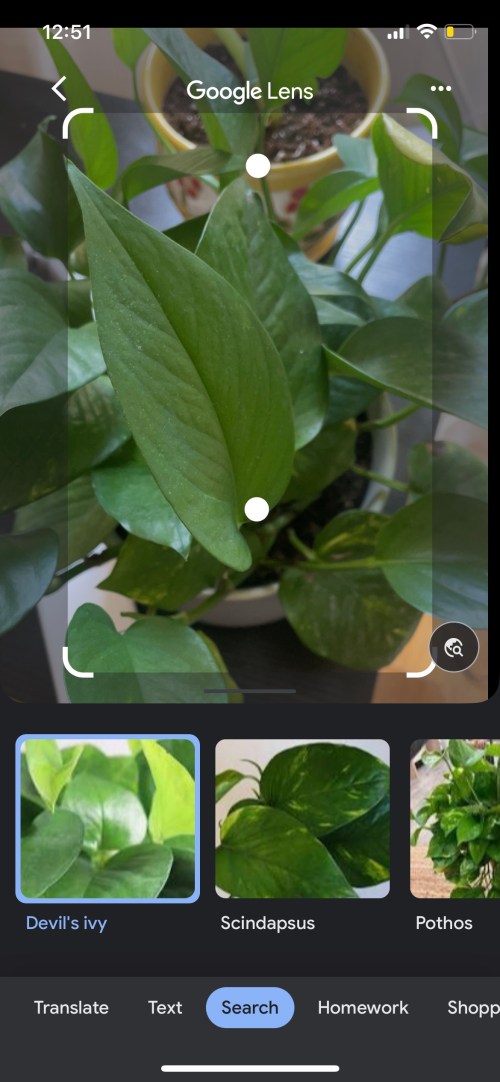
Pros:
- Free
- Accurate identification
- Easy to use
- Can be used to identify basically anything
- Provides suggestions like websites to buy the plant you’re identifying and supplemental resources that give more information about the plant
Cons:
- No social media component
- You have to click through suggested websites in order to learn more about your plant
5. Seek by iNaturalist

Price: Free
The Seek by iNaturalist app can turn a local hike into an exciting plant identifying adventure. Created by the 501 nonprofit network iNaturalists, this app helps you identify the plants, animals, and insects native to your area. This app has frequently-updated challenges, where you can earn badges and awards for spotting nearby species.
While fun for a family outing, this app is pretty limited; there’s very few features outside of plant and animal identification, and it doesn’t provide any in-depth information about the plant you’re identifying. For a free app, though, you get what you pay for.
As for accuracy, our pothos was no match for this plant identifier app. It identified the species instantly after we focused the in-app camera on its leaves. Score!
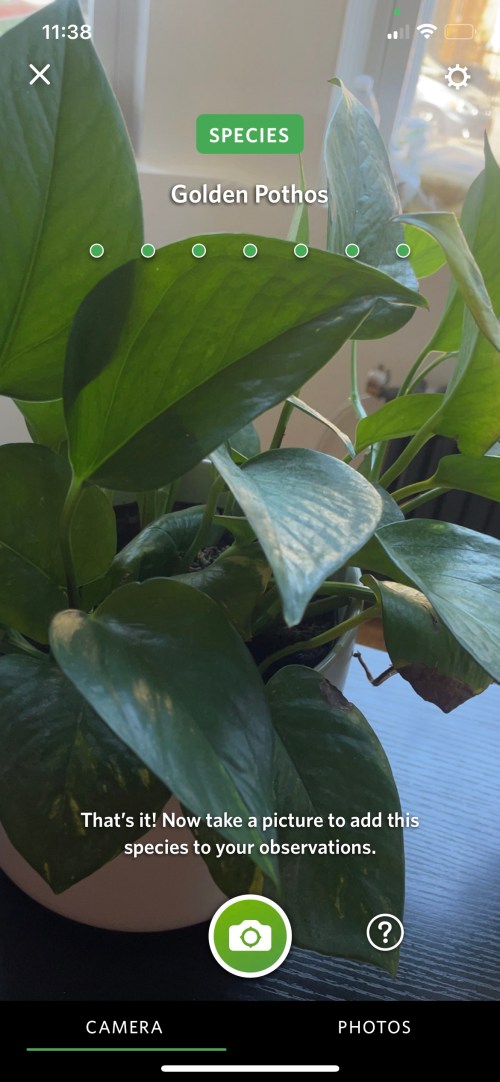
Pros:
- Free
- Accurate identification
- Badges, achievements, and challenges make it fun
- Also identifies insects and animals
Cons:
- No social media component for non-iNaturalist members
- No plant care information or features
6. PlantNet
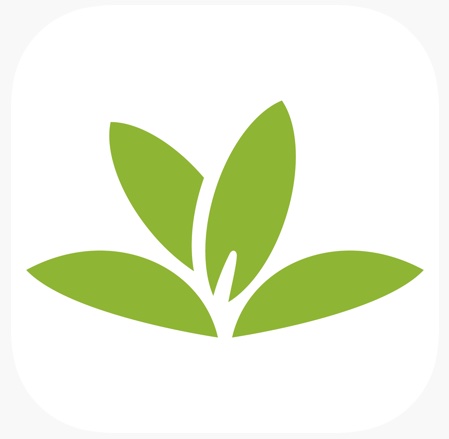
Price: Free
Originally launched in 2013, the PlantNet app brings plant lovers together through its ever-evolving plant database. Described as a ‘citizen science project’, this plant identifier app includes a strong social media component where users can share plant photos and discover other plant discoveries made by people who live in the same area.
One drawback of this plant identifier app is its limited species database. This app’s plant directory grows when users identify and add new species to its database. This could make it difficult to identify a unique or rare species.
As for our pothos, PlantNet recognized it almost immediately. Considering its social media component, GPS feature, and identification accuracy, this free app is well worth the download.
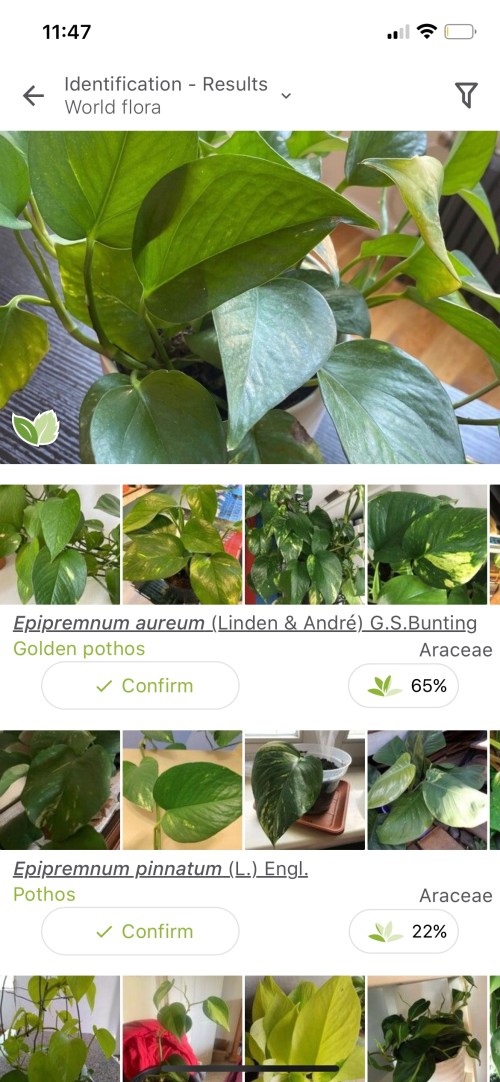
Pros:
- Free
- Accurate identification
- Social media components like My Groups and Feed allow you to see the plants that other members are capturing
- Uses your GPS location to give native plant recommendations
Cons:
- No plant care information or features
- No plant diagnoses option
- Database has roughly 42,000 species, far less than some other apps on this list
FAQs
Which plant identifier app is most accurate?
We used a golden pothos as a test subject for each app, and based on our experiences, PlantNet, Seek by iNaturalist, Google, Blossom, and PictureThis were all able to accurately identify the plant with ease.
While very useful as a plant care app, Plantum was the weakest of this list in terms of plant identification accuracy.
Can I take a picture of a plant and have Google identify it?
Yes!
In fact, one of our favorite free plant identification apps on this list is Google. The app uses Google Lens technology to scan the image of your plant and compare it to images found across the world wide web in order to accurately identify it.
Is there a 100% free plant ID app?
Yes!
Google, PlantNet, and Seek by iNaturalist are three free plant identification apps that proved to be incredibly accurate in identifying our golden pothos plant. You won’t get bombarded with paid membership prompts on these apps, either.
What are the best free apps for identifying plants?
Of the three no-cost options on this list, PlantNet wins the title of Best Free Plant Identification App. While limited in its abilities, its strong social media component and accuracy makes identifying native plants fun.
Is there a plant app to tell you what’s wrong with your plant?
Yes!
While Plantum failed to amaze us in the plant identification department, it’s a stellar plant diagnosis app. Not only can it spot plant health issues, it also can provide in-depth instructions on how to remedy the issue based on your plant’s specific needs.
Another plant diagnosis app on this list is Blossom. Blossom was a more accurate plant identifier than Plantum, but lacked some of the novel features that Plantum has.
Perhaps the strongest plant diagnosis app on this list is PictureThis. This app asks you to take a series of photos of the sick part of your plant, using it to explain why and how it’s happening. The app also gives extremely detailed instructions on how to fix it and prevent it from happening in the future.
Sign Up for Our Daily Newsletter
Get all the latest in wellness, trends, food, fitness, beauty, and more delivered right to your inbox.
Got it, you've been added to our email list.








